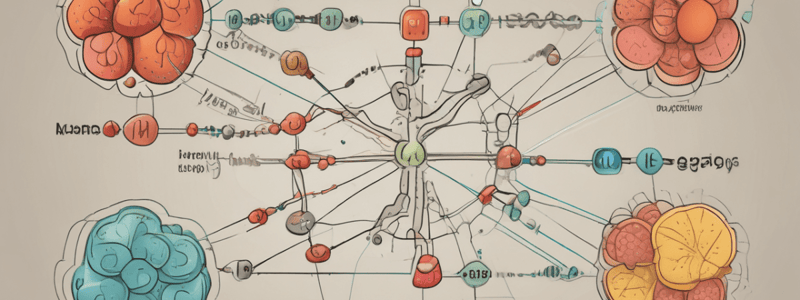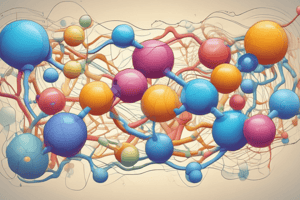Podcast
Questions and Answers
What is the primary function of the glycolytic pathway?
What is the primary function of the glycolytic pathway?
- To break down glucose to provide energy and intermediates for other metabolic pathways (correct)
- To produce NADPH through the pentose phosphate pathway
- To store glucose as glycogen
- To detoxify drugs through the glucuronic acid pathway
In which conditions can glycolysis function?
In which conditions can glycolysis function?
- Only under aerobic conditions
- Only under anaerobic conditions
- Neither under aerobic nor anaerobic conditions
- Under both aerobic and anaerobic conditions (correct)
What is the end product of glycolysis in cells with mitochondria and adequate oxygen supply?
What is the end product of glycolysis in cells with mitochondria and adequate oxygen supply?
- Glucose
- Glycogen
- NADPH
- Pyruvate (correct)
What is the consequence of deficient enzymes of glycolysis, such as pyruvate kinase?
What is the consequence of deficient enzymes of glycolysis, such as pyruvate kinase?
Why is glycolysis important for skeletal muscle function?
Why is glycolysis important for skeletal muscle function?
What is the primary route for carbohydrate metabolism?
What is the primary route for carbohydrate metabolism?
What is the significance of glycolysis in the absence of oxygen?
What is the significance of glycolysis in the absence of oxygen?
What is the role of glucokinase in the maintenance of blood glucose homeostasis?
What is the role of glucokinase in the maintenance of blood glucose homeostasis?
What is the effect of elevated levels of ATP on PFK-1?
What is the effect of elevated levels of ATP on PFK-1?
What is the relationship between glycolysis and other metabolic pathways?
What is the relationship between glycolysis and other metabolic pathways?
What is the difference between glucokinase and hexokinase in terms of glucose affinity?
What is the difference between glucokinase and hexokinase in terms of glucose affinity?
What is the effect of fructose 6-phosphate on glucokinase activity?
What is the effect of fructose 6-phosphate on glucokinase activity?
What is the role of hexokinase in the liver?
What is the role of hexokinase in the liver?
What is the effect of glucose on glucokinase activity?
What is the effect of glucose on glucokinase activity?
What is the result of mutations that decrease the activity of glucokinase?
What is the result of mutations that decrease the activity of glucokinase?
What is the role of fructose 2,6-bisphosphate in the regulation of glycolysis?
What is the role of fructose 2,6-bisphosphate in the regulation of glycolysis?
What is the primary location of transport in the epithelial cells?
What is the primary location of transport in the epithelial cells?
What is the first stage of glycolysis?
What is the first stage of glycolysis?
What is the net ATP production per glucose molecule metabolized in glycolysis?
What is the net ATP production per glucose molecule metabolized in glycolysis?
What is the enzyme that catalyzes the phosphorylation of glucose to glucose-6-phosphate?
What is the enzyme that catalyzes the phosphorylation of glucose to glucose-6-phosphate?
What is the characteristic of hexokinase?
What is the characteristic of hexokinase?
What is the function of glucokinase in β cells?
What is the function of glucokinase in β cells?
What is the characteristic of glucokinase?
What is the characteristic of glucokinase?
What is the result of inhibited further metabolism of glucose-6-phosphate?
What is the result of inhibited further metabolism of glucose-6-phosphate?
What is the effect of elevated levels of glucagon and low levels of insulin during fasting?
What is the effect of elevated levels of glucagon and low levels of insulin during fasting?
What is the role of 2,3-BPG in red blood cells?
What is the role of 2,3-BPG in red blood cells?
What is the effect of fructose 1,6-bisphosphate on pyruvate kinase in the liver?
What is the effect of fructose 1,6-bisphosphate on pyruvate kinase in the liver?
What is the effect of phosphorylation by a cAMP-dependent protein kinase on pyruvate kinase?
What is the effect of phosphorylation by a cAMP-dependent protein kinase on pyruvate kinase?
What is the effect of glucagon on pyruvate kinase?
What is the effect of glucagon on pyruvate kinase?
What is the effect of fructose 2,6-bisphosphate on glycolysis?
What is the effect of fructose 2,6-bisphosphate on glycolysis?
What happens to PEP when pyruvate kinase is inactivated?
What happens to PEP when pyruvate kinase is inactivated?
What is the effect of insulin on fructose 2,6-bisphosphate?
What is the effect of insulin on fructose 2,6-bisphosphate?
What is a common complication in individuals with pyruvate kinase deficiency?
What is a common complication in individuals with pyruvate kinase deficiency?
What is the result of an elevated NADH/NAD+ ratio in exercising skeletal muscle?
What is the result of an elevated NADH/NAD+ ratio in exercising skeletal muscle?
In which tissues is lactate oxidized to pyruvate?
In which tissues is lactate oxidized to pyruvate?
What is the result of lactate accumulation in muscle during intense exercise?
What is the result of lactate accumulation in muscle during intense exercise?
What is the direction of the lactate dehydrogenase reaction dependent on?
What is the direction of the lactate dehydrogenase reaction dependent on?
What is the fate of lactate in the liver?
What is the fate of lactate in the liver?
What is lactic acidosis?
What is lactic acidosis?
What can cause lactic acidosis?
What can cause lactic acidosis?
Flashcards are hidden until you start studying
Study Notes
Major Pathways of Carbohydrate Metabolism
- Glucose is the central molecule of carbohydrate metabolism
- Major pathways of carbohydrate metabolism begin or end with glucose
- These pathways include:
- Utilization of glucose as a source of energy
- Gluconeogenesis from non-carbohydrate precursors
- Storage of glucose as glycogen
- Release of glucose from glycogen
- Pentose phosphate pathway for production of NADPH
- Use of glucose in glucuronic acid pathway for drug detoxification
Overview of Glycolysis
- Glycolysis is the breakdown of glucose to provide energy (in the form of ATP) and intermediates for other metabolic pathways
- Glycolysis is the principal route for carbohydrate metabolism
- Glycolysis provides ATP in the absence of oxygen, allowing skeletal muscle to perform at high levels of work output when oxygen supply is insufficient
- Diseases in which enzymes of glycolysis are deficient are mainly seen as hemolytic anemias or fatigue
Stages of Glycolysis
- Phosphorylation stage: glucose is converted to glucose-6-phosphate using ATP
- Splitting stage: aldolase and isomerase reactions occur
- Oxido-Reduction stage: ATP is produced by substrate-level phosphorylation
Regulation of Glycolysis
- Hexokinase: phosphorylates glucose to glucose-6-phosphate, inhibited by glucose 6-phosphate, and has a high affinity for glucose
- Glucokinase: phosphorylates glucose to glucose-6-phosphate in liver parenchymal cells and β cells of the pancreas, has a lower affinity for glucose, and functions as a glucose sensor
- 6-Phosphofructo-1 kinase: a regulatory enzyme of glycolysis, inhibited by ATP and activated by fructose 2,6-bisphosphate
- Pyruvate kinase: activated by fructose 1,6-bisphosphate, and inactivated by phosphorylation by a cAMP-dependent protein kinase
Pyruvate Kinase Deficiency
- A rare genetic disorder that causes hemolytic anemia and associated complications
- Symptoms may range from mild to severe, and may include an enlarged spleen, excess iron in the blood, and gallstones
- Severe cases can be life-threatening in infancy and may require regular blood transfusions to survive
Lactate Formation in Muscle
- In exercising skeletal muscle, NADH production exceeds the oxidative capacity of the respiratory chain, leading to an elevated NADH/NAD+ ratio and favoring the reduction of pyruvate to lactate
- Lactate accumulates in muscle, causing a drop in intracellular pH, potentially resulting in cramps
- Lactate can be used by the liver to make glucose
Lactic Acidosis
- Elevated concentrations of lactate in the plasma, often occurring when there is a collapse of the circulatory system or when an individual is in shock
- May occur in myocardial infarction, pulmonary embolism, and uncontrolled hemorrhage
Studying That Suits You
Use AI to generate personalized quizzes and flashcards to suit your learning preferences.




